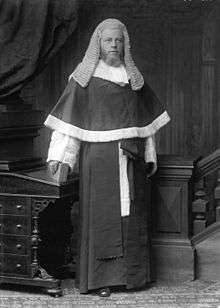Henry Lopes, 1st Baron Ludlow
| The Right Honourable The Lord Ludlow PC, QC | |
|---|---|
 | |
| Lord Justice of Appeal | |
|
In office 1885–1897 | |
| Personal details | |
| Born | 3 October 1828 |
| Died | 25 December 1899 (aged 71) |
| Nationality | British |
| Alma mater | Winchester College; Balliol College, Oxford |
| Occupation | Judge |
| Profession | Barrister; Member of Parliament |
Henry Charles Lopes, 1st Baron Ludlow, PC, QC (3 October 1828 – 25 December 1899) was a British judge and Conservative Party politician.
Background and education
Ludlow was a younger son of Sir Ralph Lopes, 2nd Baronet, and the uncle of Henry Lopes, 1st Baron Roborough. He was educated at Winchester and Balliol College, Oxford, and was called to the Bar, Inner Temple, in 1852.
Political and legal career

Ludlow sat as Member of Parliament for Launceston from 1868 to 1874 and for Frome from 1874 to 1876. He was also a Recorder of Exeter from 1867 to 1876 and became a Queen's Counsel in 1868.
In 1876, he was appointed a Justice of the Common Pleas Division of the High Court of Justice, a post he held until 1880, and then served as a Lord Justice of Appeal from 1885 to 1897.
Lopes was knighted in 1876 and sworn of the Privy Council in 1885. In 1897, he was raised to the peerage as Baron Ludlow, of Heywood in the County of Wiltshire.[1]
Judgments
- Learoyd v Whiteley [1887] UKHL 1, (1887) 12 AC 727 - (Lopes concurring with Cotton LF and Lindley LF in the Court of Appeal) - the House of Lords affirmed the Court of Appeal decision in this English trusts law case concerning the duty of care owed by a trustee when exercising the power of investment.
- British South Africa Co v Companhia de Moçambique [1893] AC 602 (Lopes sitting in the Court of Appeal) - the House of Lords overturned Lopes' Court of Appeal decision and by so doing established the Mozambique rule, a common law rule in private international law that renders actions relating to title in foreign land, the right to possession of foreign land, and trespass to foreign land non-justiciable in common law jurisdictions.[2]
- The Satanita [1897] AC 59 - Contract law case atypical of the conventional offer & acceptance pattern seen in English law. Lopes decision at appeal affirmed by the House of Lords.
Family
Lord Ludlow married Cordelia Lucy, daughter of Erving Clark, in 1854. They had one son and five daughters. She died in 1891. Lord Ludlow survived her by eight years and died in December 1899, aged 71. He was succeeded by his only son, Henry.[1]
References
- 1 2
 Rigg, James McMullen (1901). "Lopes, Henry Charles". In Sidney Lee. Dictionary of National Biography, 1901 supplement. London: Smith, Elder & Co.
Rigg, James McMullen (1901). "Lopes, Henry Charles". In Sidney Lee. Dictionary of National Biography, 1901 supplement. London: Smith, Elder & Co. - ↑ "Report 63 (1988) – Jurisdiction of Local Courts Over Foreign Land.". Law Reform Commission, New South Wales. 30 May 2001. Retrieved 2008-09-01.
External links
| Wikimedia Commons has media related to Henry Lopes, 1st Baron Ludlow. |
- Hansard 1803–2005: contributions in Parliament by Henry Lopes
- Portraits of Henry Lopes, 1st Baron Ludlow at the National Portrait Gallery, London

- Leigh Rayment's list of baronets
- Leigh Rayment's Historical List of MPs
| Parliament of the United Kingdom | ||
|---|---|---|
| Preceded by Alexander Henry Campbell |
Member of Parliament for Launceston 1868–1874 |
Succeeded by James Henry Deakin |
| Preceded by Thomas Hughes |
Member of Parliament for Frome 1874–1876 |
Succeeded by Henry Samuelson |
| Peerage of the United Kingdom | ||
| New creation | Baron Ludlow 1897–1899 |
Succeeded by Henry Yarde Buller Lopes |